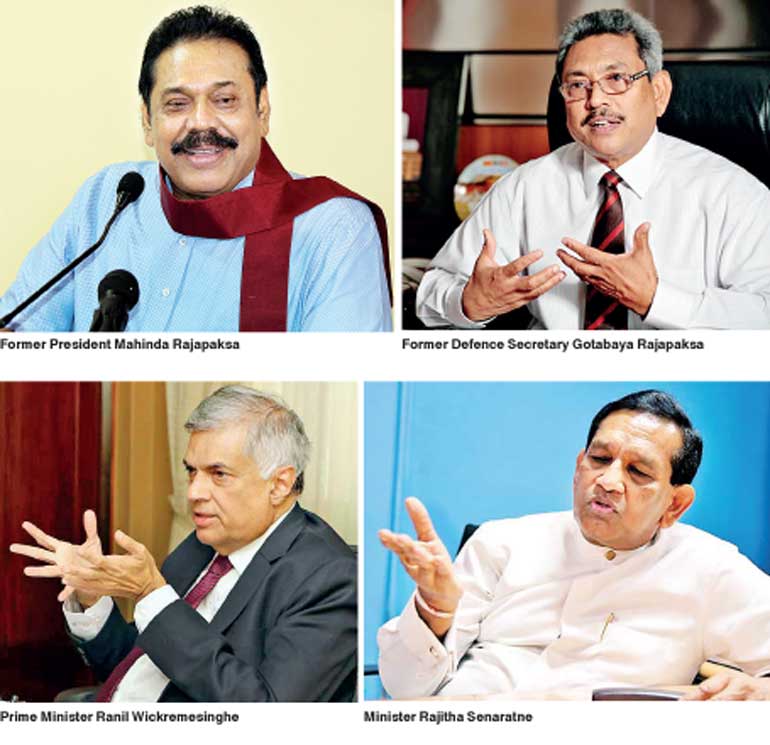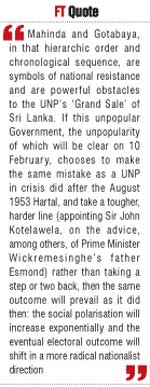Wednesday Mar 04, 2026
Wednesday Mar 04, 2026
Saturday, 3 February 2018 00:26 - - {{hitsCtrl.values.hits}}

Henry Kissinger and Oliver Stone, who had very little in common, are both credited with originating the saying “just because you are paranoid it doesn’t mean they aren’t out to get you” and its variation which goes “even if you are paranoid you can have real enemies”. The same goes for garrulous gasbags. Just because someone is a garrulous gasbag it doesn’t mean they can’t tell the truth or aren’t telling the truth.
Minister Rajitha Senaratne is possibly the biggest gasbag in the Yahapalana Cabinet, followed at some distance by Sarath Fonseka, Champika Ranawaka and Mangala Samaraweera though not in any particular order. And yet, when Rajitha Senaratne says, as a local newspaper reported as its page one lead story of 1 February that Gotabaya Rajapaksa will be arrested and jailed after 10 February, I do not dismiss it as pure, if characteristic, garrulity. The report says that he made the statement at a public rally in Matara. I believe Rajitha is telling the truth.
Now in the first place, this makes matters easier for politicians and most importantly, voters. We the citizens know full well, what is to come if the UNP is not defeated or succeeds in forming a coalition with the official SLFP, on/after 10 February.
Speaking in Vavuniya, the Prime Minister said that Trincomalee port and the oil tank farm will be “developed” with the assistance of a Singapore firm (hopefully not one that Arjuna Mahendran works for), and went on to say that “with Tamil Nadu progressing rapidly, such a development of Trincomalee will directly benefit the north and east, including Vavuniya”.
Meanwhile the TNA election manifesto calls for the implementation of the Oslo agreement which Prime Minister Ranil Wickremesinghe entered into with the Tigers in 2002, pledging “internal self-determination” through “federalism”. This comes after M.A. Sumanthiran’s Jaffna speech several weeks back in which he explained to a Jaffna audience that the proposed new Constitution goes “beyond federalism”.
 Now this is the very TNA that the Yahapalana administration has empowered by conferring it the important status of the Opposition in Parliament, though it has only 16 seats and the Joint Opposition has over three times as many.
Now this is the very TNA that the Yahapalana administration has empowered by conferring it the important status of the Opposition in Parliament, though it has only 16 seats and the Joint Opposition has over three times as many.
The drafter of the LTTE’s ISGA proposal, Prof. Sornaraja, Singapore based brother-in-law of ex-President Kumaratunga’s ex-advisor on ethnic affairs, addressed a seminar in Jaffna a few weeks back, at which Chief Minister Wigneswaran called for an “international legal framework” for the Tamil question, and pledged to have this raised at the upcoming March session of the UNHRC in Geneva at which, as the good Chief Minister reminded his audience, the UN High Commissioner for Human Rights is to present his interim progress report on Sri Lanka’s implementation of the 2015 resolution.
Meanwhile Finance Minister Mangala Samaraweera has rolled out a Budget which envisages the lifting of the land reform laws and permitting foreign companies to buy large tracts of land on this small island (there’s no guarantee that the said companies won’t be fronts for LTTE black money flows through diaspora conduits).
The UNP’s Ajith Perera says the new Constitution will be fast-tracked after 10 February. Prime Minister Wickremesinghe himself says that in accordance with the PRECIFAC recommendations former President Rajapaksa will lose his civic rights not merely for seven years but for the rest of his lifetime. This is echoed by Champika Ranawaka, Rajitha Senaratne and the SLFP’s Mahinda Samarasinghe. Now, Rajitha Senaratne says Gotabaya will be arrested and jailed after 10 February.
Four favours
Not every day does anyone do us citizens favours for free. These are our lucky day. All these statement do us four favours at least.
Firstly, we all know what we are voting for if we vote for the UNP. Secondly, we now know why the UNP wants to remove Mahinda’s civic rights and jail Gotabaya. The UNP wants to knock out Mahinda and Gotabaya as the next logical step of the process of making the TNA the Opposition, and precisely because it wants to implement the larger program it has just laid out: giving Trincomalee to the Indians and thereby empowering the north and east; implementing a new Constitution which grants power over land to the provinces and is a remix of the LTTE’s ISGA drafted by Prof Sornaraja; allowing foreign companies, including Tamil Nadu and diaspora based companies to own vast tracts of land on this island. Mahinda and Gotabaya have to be removed, if Sri Lanka is to be dismantled and sold off.
Thirdly, we know what to do if we disagree with such a future for our country: vote against the UNP in massive numbers on 10 February and as long as Ranil remains the leader. Fourthly, we know what we’ll be voting against if we vote against the UNP.
Mahinda and Gotabaya
Mahinda and Gotabaya, in that hierarchic order and chronological sequence, are symbols of national resistance and are powerful obstacles to the UNP’s ‘Grand Sale’ of Sri Lanka. If this unpopular Government, the unpopularity of which will be clear on 10 February, chooses to make the same mistake as a UNP in crisis did after the August 1953 Hartal, and take a tougher, harder line (appointing Sir John Kotelawela, on the advice, among others, of Prime Minister Wickremesinghe’s father Esmond) rather than taking a step or two back, then the same outcome will prevail as it did then: the social polarisation will increase exponentially and the eventual electoral outcome will shift in a more radical nationalist direction.
Given that they are widely perceived as saviours of the nation from the terror of the Tamil Tigers, if Mahinda and/or Gotabaya are subject to victimisation and legalised repression it will not be mere social antipathy as in 1955-56, but active anger and hatred that the UNP Government stacks up against it as in 1988. Today there is no Ranasinghe Premadasa as PM, candidate and President to save it from the “fire and the fury” of rampant nationalist populism.
If anything swings the choice in favour of Gotabaya as presidential candidate rather than a more moderate progressive candidate, it will be a spell in jail. If anything radicalises—politically and ideologically ‘weaponises’ Sinhala nationalism, and tilts the balance between the progressive populist and radical nationalists in the growing Opposition camp, it will the arrest of Gotabaya.
If anything assures a huge swing of Sinhalese of all parties including the urban UNP in his favour at the election of November 2019, it will be a stint of legalised martyrdom. If anything makes the post-UNP regime of 2019-2020 more determinedly Sinhala nationalist, it will be a defensive retaliation for the affront of an attack Mahinda and Gotabaya are symbols of national resistance and are powerful obstacles to this grand sell out of Sri Lanka.
If anything guarantees that the defeated UNP of 2019-2020 faces a “Jacobin” outcome, and signals that the Greens should already get their green cards, it is a move to disenfranchise Mahinda Rajapaksa and jail Gotabaya Rajapaksa. I belong to the generation that saw on Western TV, the South Vietnamese equivalent of Ranil’s UNP, kicked off US helicopters while clinging to their skids during the evacuation of 30 April 1975.

